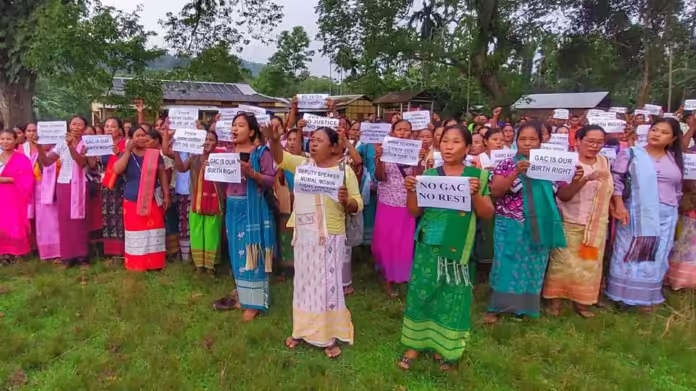In Assam, Garo organizations have united to demand the establishment of an autonomous council, expressing deep dissatisfaction with recent actions taken by the Deputy Speaker, Dr. Numal Momin. The General Secretary of the Garo National Council (GNC), Enindra Marak, highlighted troubling developments during a press conference. He claimed that a meeting took place on September 23 at the Deputy Speaker’s official residence, where Garo leaders were allegedly pressured to sign documents supporting the Garo District Council (GDC).
Marak emphasized the significance of an autonomous council for the Garo community, asserting that it is essential for ensuring political representation and safeguarding cultural identity. He noted that the push for autonomy is not merely a demand but a necessity to address historical grievances and ongoing socio-economic challenges faced by the Garo people. The GNC leader pointed out that the current political framework has failed to provide adequate support for the community’s needs, leading to widespread discontent.
Criticism directed at Dr. Momin focuses on his perceived attempts to manipulate Garo leaders into endorsing the GDC. Marak accused him of sidelining genuine discussions about autonomy, framing the actions as a tactic to consolidate power rather than to uplift the Garo community. This situation has fueled concerns about the legitimacy of the GDC and its ability to represent the interests of the Garo people effectively.
The Garo organizations have called for an immediate cessation of such practices, urging the Deputy Speaker to engage in constructive dialogue instead. Marak reiterated that the Garo community deserves a platform that genuinely represents their aspirations and addresses their challenges. He urged leaders to recognize the importance of grassroots involvement in decision-making processes.
The demand for an autonomous council is rooted in the Garo people’s desire for self-governance. Many believe that autonomy will empower them to make decisions that reflect their unique cultural and social needs. The community has a rich heritage, and the desire to preserve this heritage while achieving socio-economic development is at the forefront of their demands.
As the political landscape in Assam evolves, the Garo organizations remain committed to advocating for their rights. They aim to mobilize support from other communities and civil society to strengthen their call for autonomy. The GNC, along with other Garo organizations, plans to organize public meetings and awareness campaigns to educate the community about the significance of the proposed autonomous council.
Marak emphasized that the fight for autonomy is not only about political representation but also about cultural preservation. He underscored the importance of safeguarding the Garo language, traditions, and customs, which are at risk of being overshadowed in a rapidly changing socio-political environment. The call for an autonomous council aligns with the broader movement for self-determination among various indigenous communities in Assam.
In response to the growing unrest, the Assam government faces mounting pressure to address the Garo community’s concerns. Officials have acknowledged the importance of dialogue and have expressed a willingness to engage with Garo leaders to explore potential solutions. However, the community remains skeptical, having witnessed previous promises that did not translate into meaningful action.
The Garo organizations plan to maintain their momentum in the fight for autonomy. They seek to build alliances with other indigenous groups facing similar challenges in Assam. By uniting their voices, they hope to amplify their demands and create a more significant impact on the political discourse in the state.
As discussions surrounding the Garo autonomous council continue, the community’s resilience remains evident. The push for self-governance reflects a broader aspiration for dignity, respect, and recognition within the political framework of Assam. The upcoming months will be critical in determining the future of the Garo community and their quest for an autonomous council that can address their unique needs and aspirations.



